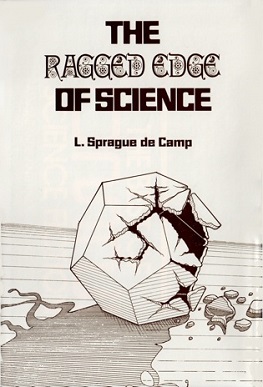
Michael Bruce Sterling is an American science fiction author known for his novels and short fiction and editorship of the Mirrorshades anthology. In particular, he is linked to the cyberpunk subgenre.

Damon Francis Knight was an American science fiction author, editor, and critic. He is the author of "To Serve Man", a 1950 short story adapted for The Twilight Zone. He was married to fellow writer Kate Wilhelm.
Speculative may refer to:

Speculative fiction is a category of fiction that, in its broadest sense, encompasses the genres that depart from reality, such as in the context of supernatural, futuristic, and other imaginative realms. This umbrella category includes, but is not limited to, science fiction, fantasy, horror, superhero fiction, alternate history, utopian and dystopian fiction, and supernatural fiction, as well as combinations thereof. The term has been used with a variety of meanings for works of literature.

Scientific romance is an archaic, mainly British term for the genre of fiction now commonly known as science fiction. The term originated in the 1850s to describe both fiction and elements of scientific writing, but it has since come to refer to the science fiction of the late nineteenth and early twentieth centuries, primarily that of Jules Verne, H. G. Wells and Arthur Conan Doyle. In recent years the term has come to be applied to science fiction written in a deliberately anachronistic style as a homage to or pastiche of the original scientific romances.
The Internet Speculative Fiction Database (ISFDB) is a database of bibliographic information on genres considered speculative fiction, including science fiction and related genres such as fantasy, alternate history, and horror fiction. The ISFDB is a volunteer effort, with the database being open for moderated editing and user contributions, and a wiki that allows the database editors to coordinate with each other. As of April 2022, the site had catalogued 2,002,324 story titles from 232,816 authors.

Brandon Winn Sanderson is an American author of high fantasy and science fiction. He is best known for the Cosmere fictional universe, in which most of his fantasy novels, most notably the Mistborn series and The Stormlight Archive, are set. Outside of the Cosmere, he has written several young adult and juvenile series including The Reckoners, the Skyward series, and the Alcatraz series. He is also known for finishing Robert Jordan's high fantasy series The Wheel of Time. Sanderson has created several graphic novel fantasy series, including White Sand and Dark One.
The New Weird is a literary genre that emerged in the 1990s through early 2000s with characteristics of weird fiction and other speculative fiction subgenres. M. John Harrison is credited with creating the term "New Weird" in the introduction to The Tain in 2002. The writers involved are mostly novelists who are considered to be part of the horror or speculative fiction genres but who often cross genre boundaries. Notable authors include K. J. Bishop, Paul Di Filippo, M. John Harrison, Jeffrey Ford, Storm Constantine, China Miéville, Alastair Reynolds, Justina Robson, Steph Swainston, Mary Gentle, Michael Cisco, Jeff VanderMeer and Conrad Williams, among others.
Rubber science is a science fiction term describing a quasi-scientific explanation for an aspect of a science fiction setting. Rubber science explanations are fictional but convincing enough to avoid upsetting the suspension of disbelief. Rubber science is a feature of most genres of science fiction, with the exception of hard science fiction. It is also frequently invoked in comic books.
Spacetime is a mathematical model in mathematics and physics.
Punk or punks may refer to:

The Ragged Edge of Science is a science book by L. Sprague de Camp, illustrated by Don Simpson. It was first published by Owlswick Press in 1980.

Lost Continents: The Atlantis Theme in History, Science, and Literature is a study by L. Sprague de Camp that provides a detailed examination of theories and speculations on Atlantis and other lost lands, including the scientific arguments against their existence. It is one of his most popular works. It was written in 1948 and first published serially in the magazine Other Worlds Science Fiction in 1952-1953; portions also appeared as articles in Astounding Science Fiction, Galaxy Science Fiction, Natural History Magazine, and the Toronto Star. It was first published in book form by Gnome Press in 1954; an updated edition was published by Dover Publications in 1970. De Camp revised the work both for its first book publication and for the updated edition.
POV most commonly refers to:
With the growth of science fiction studies as an academic discipline as well as a popular media genre, a number of libraries, museums, archives, and special collections have been established to collect and organize works of scholarly and historical value in the field.

Nisi Shawl is an African-American writer, editor, and journalist. They are best known as an author of science fiction and fantasy short stories who writes and teaches about how fantastic fiction might reflect real-world diversity of gender, sexual orientation, race, colonialism, physical ability, age, and other sociocultural factors.

Pure Speculation Festival, also known as Pure Spec, is an annual multi-genre fan convention taking place in Edmonton, Canada. It is an event that prides itself on being "by geeks, for geeks." Founded as a speculative fiction convention, it repackaged itself as a festival celebrating geek and fan culture in 2008. It offers programming dealing with science fiction, fantasy, pop culture, gaming, anime, comic books and webcomics.

The following outline is provided as an overview of and topical guide to science fiction:









